I can’t tell you how many times people tell me, “I LOVE your old work!” Sometimes I wish I still loved doing what I used to do, but I don’t, and here is why.
The subject matter of my early work was attractive to me as a vehicle for reflecting my personal emotions: The horizon as the unrealized or the unattainable; empty landscapes as the isolation of the human condition, the hill in front of the viewer reflecting my sense of the Sisyphean struggle of life, etc. I was a biology student and a naturalist. I saw myself as “a speck of dust on the skin of creature earth,” and the landscapes and figures I painted were really self-portraits. I felt compelled to paint but I wasn’t very technically proficient.
A neophyte painter spends a lot of time just learning to master the medium and experimenting with its limits. For example, seeing a color and wanting to accurately translate it into a mixture of paint takes concentration and practice until that skill finally becomes second nature. Over the years technical proficiency did become second nature. I remember the sense of accomplishment I felt when I was able to make distance look distant, or to make a shadow look real, or to capture clouds, or perspective and composition. I also remember how quickly the satisfaction ended. The steps of painting began to seem to be: 1. Get a good idea 2. Commence the long boring execution of previous thought. 3. Wonder if a photo would do the trick instead. Painting had begun to lose its mystery and completing a piece felt like a long series of boring, linear steps to perform. My painting practice began to feel like typing instead of writing but I had not yet developed skills besides painting “accurately.” You could say I was stuck without knowing it. Everything seemed to be going so well in terms of my career – I got a lot of kudos and made a lot of sales, but I wasn’t feeling very inspired anymore.
I started to notice that the paintings I was admiring at that point had some element of controlled accident or spontaneity in their brushstroke that I really admired and I started trying to incorporate that into my own work. The places I depicted became increasingly indistinct and universal. People see any horizontal line as a landscape and the landscape was still present in my work largely because it was my vehicle, not because the scene itself meant something to me. Since the paintings were not at all about place, but about life, the word “landscape” didn’t feel like it fit me anymore, but I was still described as a landscape painter. I felt misunderstood, but perhaps it was me who misunderstood that I was being anchored by my dead relationship to a vehicle.
At that point I still did not have any attraction to abstract art. I did not understand it. I would look at something by Joan Mitchell or Milton Resnick (powerful inspirations now) and think that old cliché, “a kid could paint that!”
I wanted to be open minded, but trying to like abstraction was like trying to love a book that was written in a language I couldn’t read. It felt phony to have an opinion about something I hadn’t really experienced. Maybe being a realistic painter myself made the process harder, because I did understand some of the alphabet and ran what I saw through the filter of my own formal artistic vocabulary, while an onlooker could take all art in equally as if they were reading Lewis Carroll’s Jabberwocky, understanding nothing and everything at the same time.
Artistic growth stemmed from that dissatisfaction. (Doesn’t all growth come from something unpleasant?) Over time, marks that once looked like mistakes began to look compelling and so I tried to focus on them. It was much harder to move forward without a road map, so to speak, but knowing where I was supposed to end up was what was killing the creativity in the first place so I learned to embrace the process. The most wonderful part of this different approach was that each step of the piece was informed by the last mark made instead of some final vision of how the work should end up, lending a give and take to the creation of each piece that lasted from the first mark until the very last. Making each painting felt like solving a puzzle or a riddle, or slowly discovering what is there to be discovered. Naturally the horizon was left behind in this process, as was the need to reference anything real and external. The painting became a map or testament to the dialogue of the process.
A wonderful thing about this transformation is that now when I see other’s work through my own experience I have a platform that is much broader than, “a kid could paint that.” The randomness of “scribble” art used to bother me, for example, but now I don’t see it as random at all. I see the genius of an artist who never got bogged down in formalism in the first place. All sorts of art seems more accessible now. A world of appreciation has been opened up to me.
I still love painting with skill: showing effects of light, of distance, of mood… carefully mixing colors, and caring about composition. I don’t think I could paint the way I do now without all those years of working on technical skill. I still grapple with the idea that there is no right and wrong, and I still feel weighted down by a burning desire to move forward without exactly knowing how. In twenty more years I will probably look back with clarity about this phase as well.
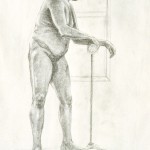
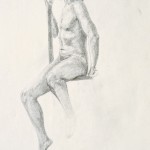
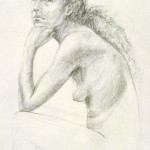
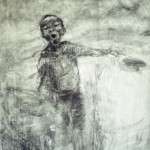
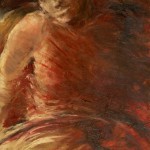
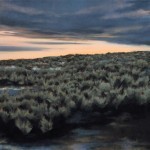
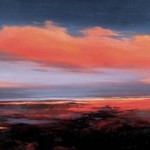
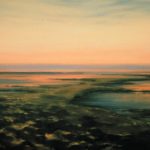
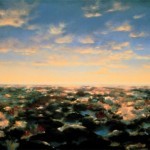
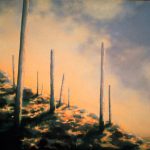
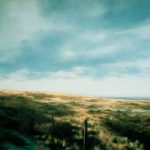
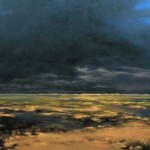
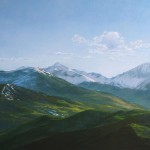
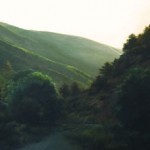
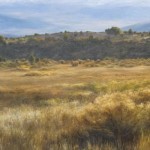
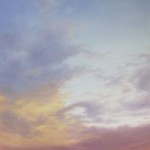
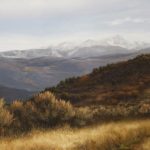
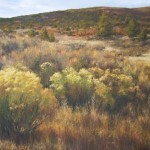
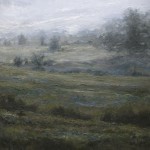
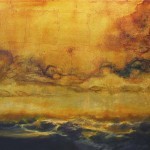
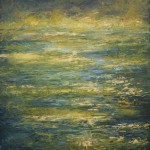
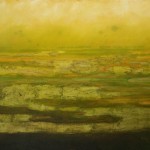
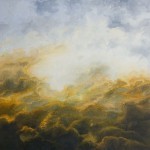
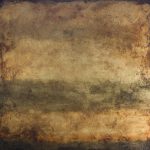
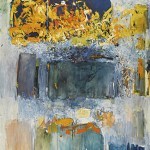
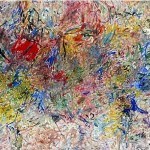
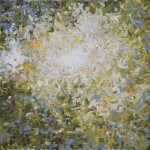
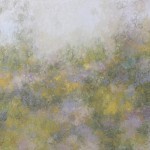
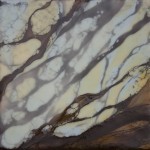
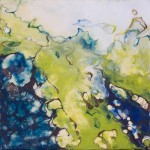
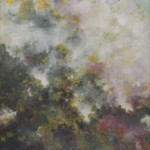
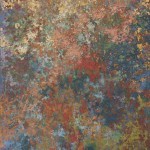
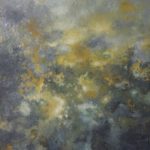
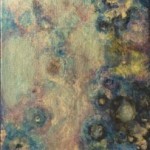
16 Comments
Just browsed you latest work. I think the abstract in you is powerful and compelling. You have that ‘Resnick’ quality; and I hope you take that as a compliment. He was a genius – and you, you keep what you are doing; you paint beautifully and I hope to be able to view some of your works up close soon.
Cheers
Chris Walker
Sydney – Australia
Chris, thanks so much for connecting me to Resnick – he has been very influential, although I have only seen his work online. Have you seen it in person? I spent a lot of time looking at “Mound” online. That piece is mesmerizing. I don’t even know where it is in the world. Do you?
Tania, Thanks so much for posting about your process. I’m at the point you’ve described. I can paint pretty well, but not nearly as well as I’d like. I can’t seem to express what I want, it’s too difficult to convey with a realistic image and I know the precess would be tedious and the outcome dull. Even though, I’ve been exposed to quite a bit of it, it still feels that to switch to abstract would work would be random, lazy and pretentious of me. Again thanks for sharing. I’ll be watching your work to see how you are transitioning.
– Esther
Kansas City
I understand how and why you would feel that way, but don’t let it keep you from experimenting. Go to a contemporary exhibit and then come home and let loose. Try not to judge what you do, and live with some experiments for awhile to see if they grow on you. It takes some time but you will develop a language and become fluent over time, then you won’t feel so lost anymore when moving forward with your work.
Tania, Wonderful article and so timely for me as I am starting to explore bringing abstraction to my landscape paintings. Did you find a particular book that was inspiring to you for loosening up and making the break from realism? Your abstract pieces are serene and full of movement. Thank you for sharing your thoughts.
No, Gina, there was no book or specific inspiration. Just start trying, and be okay with failing and being unsure. You might need to keep the pieces you are working on in view for awhile because when you are in new territory it is hard to know what you think and what will “float to the top” over time. Just be okay with that and keep moving forward. If you are interested in trying then you already have all the inspiration you need. Just get used to feeling a little lost for awhile as you try new things.
This is a great post to read, I am having yearnings for something more in my painting, without a map, to have the intuitive part of the process be throughout the painting, not in just the selection of the image to paint. I am grateful that you posted your experience! Sculptor Ursula Von Rydingsvard says to let frustration and boredom be your guide to the next things in your art. I am trying to find my way to what’s next. Thanks for your thoughts!
Be brave. It is okay to spend months thinking you might be making total crap as you try new things. Ignore your own bad feelings and they will resolve as you slowly find your way. It is sort of exciting in an awful way 🙂
Thank you, thank you, Tania, for your inspiring words. As a long time landscape artist I have been edging my way to abstraction for a long time…took a course from Crag Taylor, have gone to numerous shows – latest was the big Miami show in December but still feel insecure. All of my work is crap and not what I know I want to say. Thanks for your inspiration. I will keep painting no matter what!
You got it! 🙂
Enjoyed your commentary here so much. I’m also hitting that plateau as a realist. I need there to be something more… I’ve known for a while that I’ve just got to dive into it and be prepared to have some failures. This has been encouraging for me to just go ahead and get started. Thanks!
I’m glad you find it helpful Jill. It is an ongoing process to be okay with failing, but it will get you a long way. Let me know how it goes.
Thank you for expressing this so well Tania. I feel the unpleasant dissatisfaction and the compelling urge to continue to find the ways to work in abstract terms. There is an honesty in my earlier work which I must find again using what seems like a semi foreign language. To use the tools I have gained over a lifetime of drawing, sculpting and painting must be possible. I have started and can’t go back. It is a little scary isn’t it?
Yes, at first, but when you work at it enough to stop thinking about what you are doing and just do without thinking, it will mean that you are getting fluent in the language and the work will start to become your own. It still feels scary and uncomfortable when I am on new ground. Only lots of work gets me through that phase. Good luck with the journey.
Hi Tania, I too am trying to work my way into abstraction from realism. It’s been a deeply troubling, challenging yet exciting process. I always loved abstract art, particularly gestural abstraction. I was far too fearful to make the leap. Now I am playing with abstraction & enjoying making many serendipitous mistakes. I constantly worry that others will think I’ve “sold out” taken the easy way etc. I had developed so much skill it was hard to let go of the admiration I gleaned from those who were impressed by my ability to create an illusion.
I look forward to seeing what eventuates in my painting practice.
https://www.instagram.com/amandarobinsart/
Amanda, I know exactly how hard that admiration is to let go of. I also don’t think people realize how difficult it is to make a good abstract piece, and really most people can’t tell the difference between good and bad. I looked at your Insta and can see you working through this with good results. Keep going, you are on the right track. I made a comment on one of your more recent pieces which I really like.